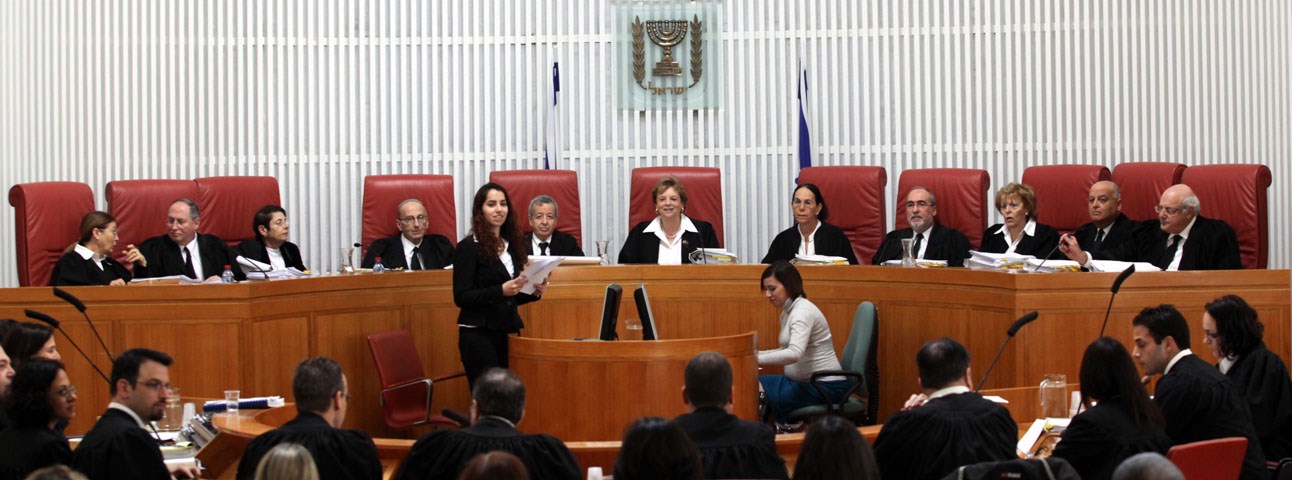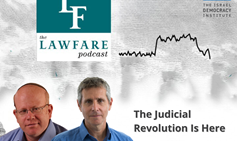

Publications Regarding The Standard of (Extreme) Unreasonableness
Articles

The HCJ Strikes Back: Israel’s Supreme Court Pulls the Plug on “Judicial Reform”
Written By: Prof. Amichai Cohen, Prof. Yuval Shany
Two judgments issued by the Supreme Court in the first week of 2024 deal a decisive blow to the Netanyahu government’s efforts to radically rebalance the branches of government.

What Was the Supreme Court’s Ruling on the Revocation of the Reasonableness Doctrine? Eight Key Points
Written By: Prof. Amichai Cohen, Dr. Amir Fuchs, Dr. Guy Lurie
The Supreme Court's ruling to strike down the amendment made to the Basic Law: The Judiciary and reinstate the Standard of Reasonableness is a landmark decision on an issue that has been exceptionally divisive within Israeli society. Will this lead to a constitutional crisis? 8 Key points from IDI's experts examining the court's decision.

The Verdict is in: Checks and Balances are Here to Stay
Written By: Prof. Suzie Navot
This decision refocused our attention not only on the specific law it struck down but also on the unfinished business of completing our country’s constitutional framework

The Supreme Court Ruling on Canceling the Reasonableness Clause—Implications
Written By: Dr. Amir Fuchs
The Supreme Court ruled that the Court has authority to perform judicial review on Basic Laws, and that an intervention was necessary in the case of the amendment to the Basic Law: The Judiciary revoking the Standard of Reasonableness. What are the implications?

Israel Democracy Institute Statement on Israel's Supreme Court Ruling
The Israel Democracy Institute issued the following statement on the High Court of Justice’s decision to strike down the amendment passed in July to the Basic Law: The Judiciary, eliminating the Court’s use of the Reasonableness Standard.

Unreasonableness and the Judicial Overhaul - Survey Analysis
Written By: Dr. Or Anabi
Data indicates that less than a third of the public supports barring the Supreme Court from intervening in decisions by politicians or public officials.

Doing Away with the Standard of Extreme Unreasonableness
Written By: Prof. Amichai Cohen
The coalition has voted to amend Basic Law: The Judiciary and repeal the Standard of Reasonableness used to review government decisions that are deemed to be extremely unreasonable. On September 12th, the Supreme Court will hear petitions against the constitutionality of this move.

Does the High Court of Justice Intervene in Decisions to Release Prisoners?
Written By: Dr. Moran Kandelshtein-Haina
Appeals to the HCJ to intervene in decisions relating to the release of prisoners are fairly common, but the Court has repeatedly rejected these appeals, noting that on issues of national defense and diplomacy, the bounds for judicial oversight are particularly narrow.

30 years after the Oslo Accords: A large share of Israelis think it was wrong for Israel to enter the process
Written By: Prof. Tamar Hermann, Dr. Or Anabi
As we mark the 30th anniversary of the Oslo Accords this month, a larger share of Jewish respondents think it was incorrect to enter into that process, while the percentage of respondents who selected "don't know" was exceptionally large.

The Supreme Court Hearing on Reasonableness: Law without Enforcement
Written By: Prof. Suzie Navot
On the question of Unreasonableness, it appears that the dispute is not only between the Knesset and the Supreme Court, but also among the justices themselves. There are many possibilities, but only one ruling, which will be handed down no later than mid-January 2024.

Following the Supreme Court Reasonableness Hearing: Where are we Now?
Written By: Yohanan Plesner , Prof. Yuval Shany
Yohanan Plesner, president of IDI and Prof. Yuval Shany, a Senior Fellow at the Center for Democratic Values and Institutions met with reporters to discuss the historic Supreme Court hearing on the repeal of the reasonableness doctrine.

Three Big Cases in Israel's September to Remember
Written By: Prof. Amichai Cohen, Prof. Yuval Shany
Three petitions before the Israeli Supreme Court are transforming the usually slow month of September into a pivotal one in Israel’s ongoing judicial crisis.

The Supreme Court Hearing on the Revocation of the Reasonableness Doctrine
Written By: Prof. Amichai Cohen
On September 12, 2023, an unprecedented panel of 15 Supreme Court Justices will convene to hear petitions requesting to strike down the recent amendment to the "Basic Law: The Judiciary."

Judicial Reform – What Comes Next? PART 2 OF 2
Written By: Prof. Yuval Shany,
In the second part of this two-part episode, Jack Omer-Jackman speaks to renowned Israeli legal scholar and IDI expert Professor Yuval Shany to discuss the Supreme Court’s upcoming deliberations on the legislation annulling reasonability; the significance of basic laws; the impact of reservists’ protests on Israel’s military preparedness and the role of a citizen army in a democracy.

Judicial Reform – What Comes Next? PART 1 OF 2
Written By: Prof. Yuval Shany,
In the first part of this two-part episode, Jack Omer-Jackman speaks to renowned Israeli legal scholar and IDI expert Professor Yuval Shany to discuss the Supreme Court’s upcoming deliberations on the legislation annulling reasonability; the significance of basic laws; the impact of reservists’ protests on Israel’s military preparedness and the role of a citizen army in a democracy.

The government must stop the judicial legislation to prevent further damage to the economy
Written By: Prof. Karnit Flug, Prof. Jacob Frenkel
Earlier this year, we published an article warning against the dangers of the judicial reforms, to our regret, many of the negative developments about which we warned at the beginning of the year have already come to pass.

Different Laws for Courts & Knesset Would Spell Disaster
Written By: Prof. Gideon Rahat,
Israel’s political system remains in turmoil as the Supreme Court prepares to hear appeals concerning the refusal of the Justice Minister to convene the Judicial Selection Committee and the constitutionality of the unreasonableness amendment at the beginning of September.

What Matters Now to former Bank of Israel governor Karnit Flug: The economy, stupid
Written By: Prof. Karnit Flug,
Prof. Karnit Flug, IDI's VP of Research, William Davidson Senior Fellow and a former governor of the bank of Israel offers data on the current effects of the controversial judicial overhaul and projections for more ripples as the high tech industry begins to unravel.

The Supreme Court of Israel: A Professional or Political Institution?
Written By: Dr. Guy Lurie, Dr. Amir Fuchs
Comparing Israel's Supreme Court to America's Supreme Court. 64 Israeli legislators, a slim majority of the Knesset, voted on Monday, July 24, to amend one of Israel's Basic Laws, and in so doing, they took away the Israeli Supreme Court's ability to strike down decisions that it finds "unreasonable in the extreme.

Haaretz Weekly: What Comes Next?
Written By: Yohanan Plesner ,
Yohanan Plesner, president of the Israel Democracy Institute, joins Haaretz Weekly host Allison Kaplan Sommer to discuss what comes next, after the Knesset passed the first law in its planned judicial overhaul.

The Day After Reasonableness
Written By: Prof. Suzie Navot
The coalition launched the first stage in its judicial overhaul. The process by which the amendment to the Basic Law: The Judiciary was passed, releasing the government and its ministers from the duty to act with reasonableness, is the best possible evidence for what we can now expect.

The Lawfare Podcast: The Judicial Revolution Is Here
Written By: Prof. Yuval Shany, Prof. Amichai Cohen
The first phase of Israel's judicial overhaul is now law. Huge numbers of people are in the streets, reservists are resigning, the stock market is tanking, and Lawfare Editor-in-Chief Benjamin Wittes assembled an all-star panel to talk about it, including IDI's Prof. Amichai Cohen and Prof. Yuval Shany.

From All-Out Assault to Salami Slicing Tactics: Israel’s Crisis Continues
Written By: Prof. Amichai Cohen, Prof. Yuval Shany
The Israeli governing coalition is now “only” trying to strip the Supreme Court of its power to conduct reasonableness review of cabinet decisions.

In Anticipation of the Knesset’s Vote on the “Reasonableness Standard” – What Happens Next?
Written By: Yohanan Plesner
With the Knesset set to hold its final vote on curtailing the “reasonableness standard,” what happens next? What are the implications of removing this type of oversight on governmental decisions, and is there still a possibility for compromise ahead of the vote?

Reasonableness in the Crosshairs
Written By: Prof. Suzie Navot
Tel Aviv-based journalist and Israel Policy Forum Policy Advisor Neri Zilber hosts Prof. Suzie Navot, the vice president for research at the Israel Democracy Institute, to analyze the renewed push by the Netanyahu government to overhaul Israel's judicial system.

Flash Survey: Most Israelis Assess that the Protest Movement Has Delayed Progression of the Judicial Overhaul
Written By: Prof. Tamar Hermann, Dr. Or Anabi
Almost a quarter of Israelis have participated in some form of protest, a majority assess that the protest movement has delayed the progress of the judicial overhaul and Likud voters are divided on the question of continuing its implementation.

The Reasonableness Issue Requires Serious, Informed, and Consensual Discussion
Written By: Prof. Suzie Navot
Only a government that wishes to make extremist and corrupt decisions would be afraid of the reasonableness test. While the test would certainly benefit from discussion of the framing of its boundaries and application, the legislation currently on the table hands the government unrestrained power.

No professionalism, no expertise – and no women
Written By: Adv. Anat Thon Ashkenazy
The Authority for the Advancement of Women's Status and agencies like it are being gutted along with protections for women

Massive Protests Show Israelis Understand Democracies Die Gradually
Written By: Dr. Nadiv Mordechay,
In Israel, the equivalent of 70 million Americans have gone out to protest the Netanyahu government's attempt to break the country's constitutional order. Populist politics is at war with the mainstream public opinion that it claims to represent.

Eliminating the Standard of Reasonableness Would be Another Step towards Giving the Government Unlimited Power
Written By: Prof. Yuval Shany
Abolishment of the standard of unreasonableness would lead to a further concentration of power in the hands of the executive – a power that is already greater in Israel than in many other democracies.

The Pot Calling the Kettle Black
Written By: Prof. Yedidia Z. Stern
In the case of a MK against whom the attorney-general has decided to file an indictment, the members of his party and of his Knesset bloc vote as one.

A Test of Reasonableness
Written By: Dr. Amir Fuchs
The bizarre constitutional situation in which we now find ourselves raises a great many legal questions, not all of which have simple answers. Does the law allow the prime minister to fire all the government’s ministers? Can he serve as “the government” by himself?

